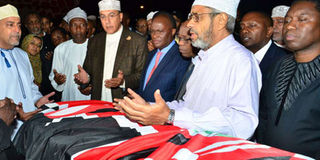Timid reaction to PS death doesn’t inspire confidence in Shabaab war

Government officials led by Tourism Cabinet Secretary Najib Balala (third left) receive the body of the late Public Works Principal Secretary Mariam El Maawy at JKIA airport on September 29, 2017. Ms El Maawy died on September 27 in a South African hospital. PHOTO | FRANCIS NDERITU | NATION MEDIA GROUP
What you need to know:
- Shying away from calling terrorism by its name is nothing but escapism.
- For their part, the governments are not expected to project weakness, become escapist or show indifference.
Mariam El Maawy, the former Principal Secretary for Public Works, was buried in a quiet ceremony at Nairobi’s Lang’ata Muslim Cemetery on Saturday.
Ms El Maawy died on September 27 in a South African hospital, a victim of a daring kidnap by Al-Shabaab terrorists in July that claimed three other lives in Lamu.
The PS was rescued from her kidnappers by Kenya Defence Forces personnel hours after the attack and flown to Nairobi the same day.
TERRORISM
But if the kidnap of a senior government official reportedly in her home county to attend peace and security meetings remained puzzling then, the official reaction to the news of her death was no less baffling.
A timid statement sent out by the Government spokesperson following a Cabinet meeting on September 28 reported the ministers eulogising Ms El Maawy as a diligent, honest and committed public servant and pledging “support for the evacuation of the body from South Africa and in the burial arrangements”.
But there was no mention of the daring terrorist attack that led to her death, with the Cabinet noting only that “the PS was attacked in the course of duty”.
Shying away from calling terrorism by its name is nothing but escapism.
SAFETY
There is a reason it is a big deal how governments respond or communicate in the wake of terrorist attacks or related events.
The public is always looking for hope – a reassurance from their governments that something is being done to keep them safe.
For their part, the governments are not expected to project weakness, become escapist or show indifference.
An attack on a top official especially sets off the alarm bells and is considered a red line crossed by the authorities.
Most heads of state even seize such moments to rally or revive public support for their administrations’ anti-terrorism efforts.
RESPONSE
Barack Obama responded to the killing of US ambassador to Libya J. Christopher Stevens by militants in Benghazi in 2012 by vowing revenge.
Although Mr Obama did not quite succeed in slaying the ghosts of Benghazi (it nearly sunk his re-election campaign), his administration learnt its lesson and gave America a plan for fighting terrorism in North Africa, including rapid response measures by security agencies in case of future attacks on US officials there.
Compare that to the timid and escapist response by the Kenyan Government in the wake of Ms El Maawy’s death and you begin to wonder whether the country still has the stomach to fight terrorism.
SHABAAB
Critics might be emboldened to revisit the controversial debate about whether Kenyan troops should continue to be involved in the African Union stabilisation force in Somalia while Al-Shabaab is still active within our borders.
It says a lot about Kenya’s fortunes in the anti-terrorism fight that since Ms El Maawy’s kidnap in July a number of security officers and civilians have been killed in spite of military planes overflying Boni forest in Lamu.
[email protected] @otienootieno





